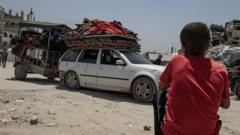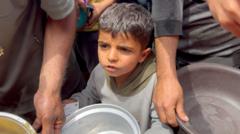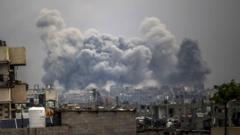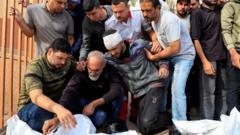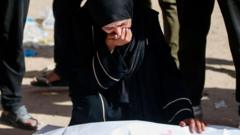The account sheds light on the complexities of the ongoing conflict and the plight of humanitarian workers in the region
Survivor's Testimony Contradicts Israeli Claims on Gaza Paramedic Attack
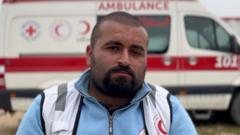
Survivor's Testimony Contradicts Israeli Claims on Gaza Paramedic Attack
Paramedic Munther Abed recounts the harrowing attack that claimed the lives of 15 emergency workers in Gaza
Munther Abed, a parademic and sole survivor of the recent Israeli attack on emergency responders in Gaza, is speaking out against the Israeli military's narrative. The attack, which occurred on March 23, left 15 emergency workers dead, including eight from the Palestinian Red Crescent. As he scrolls through photos of his fallen colleagues, Abed recounts how he narrowly escaped death by diving to the floor of his ambulance.
"We left the headquarters at dawn," he recalls to a BBC journalist. The emergency response team had mobilized following reports of casualties near Rafah when, around 05:00, they came under direct fire. While the Israeli military claims the ambulance vehicles appeared suspicious and lacked lights, Abed vehemently disputes this. "Our lights were on, everything signaled we were an ambulance," he states.
After the attack, Israeli soldiers pulled Abed from the wreckage, only to arrest and interrogate him for over 15 hours before releasing him. Meanwhile, Israeli officials continue to assert that their forces acted with caution, reportedly targeting individuals believed to be linked to Hamas.
The international response highlights concern for humanitarian workers. Sam Rose of the UN agency UNRWA has called for an investigation, pointing out that the 15 deceased were treated with "complete indignity," buried in sandy graves along a road. Saying "many ambulance workers feel increasingly insecure,” he reflects on the dire conditions the healthcare workers face in Gaza.
Families of the deceased are mourning, with calls for accountability echoing throughout the region. “My son was killed in cold blood,” lamented the father of one paramedic. People are pushing for truth and justice as the situation remains critical for those in the field.
"Without me telling their story," concludes Abed, “no one else could relay the truth of what happened to my colleagues." The continuing violence in Gaza raises inevitable questions about the safety and rights of medical personnel amid ongoing humanitarian crises.
"We left the headquarters at dawn," he recalls to a BBC journalist. The emergency response team had mobilized following reports of casualties near Rafah when, around 05:00, they came under direct fire. While the Israeli military claims the ambulance vehicles appeared suspicious and lacked lights, Abed vehemently disputes this. "Our lights were on, everything signaled we were an ambulance," he states.
After the attack, Israeli soldiers pulled Abed from the wreckage, only to arrest and interrogate him for over 15 hours before releasing him. Meanwhile, Israeli officials continue to assert that their forces acted with caution, reportedly targeting individuals believed to be linked to Hamas.
The international response highlights concern for humanitarian workers. Sam Rose of the UN agency UNRWA has called for an investigation, pointing out that the 15 deceased were treated with "complete indignity," buried in sandy graves along a road. Saying "many ambulance workers feel increasingly insecure,” he reflects on the dire conditions the healthcare workers face in Gaza.
Families of the deceased are mourning, with calls for accountability echoing throughout the region. “My son was killed in cold blood,” lamented the father of one paramedic. People are pushing for truth and justice as the situation remains critical for those in the field.
"Without me telling their story," concludes Abed, “no one else could relay the truth of what happened to my colleagues." The continuing violence in Gaza raises inevitable questions about the safety and rights of medical personnel amid ongoing humanitarian crises.



